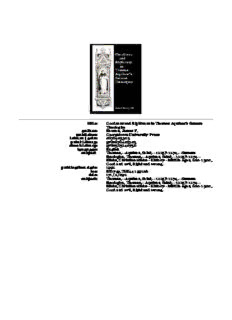
Goodness and Rightness in Thomas Aquinas's Summa Theologiae PDF
Preview Goodness and Rightness in Thomas Aquinas's Summa Theologiae
title: Goodness and Rightness in Thomas Aquinas's Summa Theologiae author: Keenan, James F. publisher: Georgetown University Press isbn10 | asin: 0878405305 print isbn13: 9780878405305 ebook isbn13: 9780585240756 language: English subject Thomas,--Aquinas, Saint,--1225?-1274.--Summa theologica, Thomas,--Aquinas, Saint,--1225?-1274-- Ethics, Christian ethics--History--Middle Ages, 600-1500, Good and evil, Right and wrong. publication date: 1992 lcc: BX1749.T6K44 1992eb ddc: 171/.2/092 subject: Thomas,--Aquinas, Saint,--1225?-1274.--Summa theologica, Thomas,--Aquinas, Saint,--1225?-1274-- Ethics, Christian ethics--History--Middle Ages, 600-1500, Good and evil, Right and wrong. Page i Goodness and Rightness in Thomas Aquinas's Summa Theologiae Page ii Page iii Goodness and Rightness in Thomas Aquinas's Summa Theologiae James F. Keenan, S.J. Page iv COVERILLUSTRATION: Fromthecoverofthe3-volume commemorativepublishedforthe sixhundredthanniversaryofthe canonizationofSaintThomasAquinas (Rome,1925,S.Szab ,ed.); courtesyofLauingerLibrary, GeorgetownUniversity. TITLE PAGE VERSO: Detail from the text page (reduced) of Question 21, Article 1 in the Prima Secundae of the Summa Theologiae (Rome, 1793, S. Capponi A Porrecta, ed.); courtesy of Woodstock Theological Library, at Georgetown University. LibraryofCongressCataloging-in-PublicationData Keenan,JamesF. GoodnessandRightnessinThomasAquinas'sSummaTheologiae/ James F.Keenan. p. cm. 1.Thomas,Aquinas,Saint,1225?1274.SummaTheologiae.2.Thomas, Aquinas,Saint,1225?1274Ethics.3.ChristianethicsHistoryMiddle Ages,6001500.4.Goodandevil.5.Rightandwrong.I.Title. II.Title:GoodnessandRightnessinThomasAquinas'sSummaTheo- logiae. BX1749.T6K44 1992 171 .2 092dc20 92-3090 ISBN0-87840-530-5(pbk.) Georgetown University Press, Washington, D.C. 20057-1079 1992 by Georgetown University Press. All rights reserved. Printed in the United States of America 10 9 8 7 6 5 4 3 2 1 1992 THIS VOLUME IS PRINTED ON ACID-FREE OFFSET BOOK PAPER. Page ix INTRODUCTION: INITIATING A DIALOGUE I began this work seven years ago, believing the simple presupposition that goodness describes persons and rightness describes actions. When I read Thomas's Summa theologiae, however, I realized that Thomas rarely if ever spoke of actions, per se, and rarely if ever talked about goodness. Instead Thomas wrote about personal actions, intentions, ends, and virtues, but these concepts contributed less to the description of good persons than to right behavior. As my work progressed I learned three new insights. First, rightness requires other objects of description than simple external acts. Second, the Summa theologiae cannot be parsed for goodness and rightness by simply presuming that intention or end is synonymous with goodness, and external act or object with rightness. Inasmuch as Thomas had other interests, I would have to find the primary concept that bears moral description. That concept would be key for finding the distinction between goodness and rightness. Third, virtue, which I had long considered as descriptive of personal goodness, began to appear as subject to rational observation and measurement. Virtue, in Thomas's writings, belongs not to goodness language, but to rightness language. Prompted by these insights, I began the investigation detailed in this book. The book itself is divided into four parts. Part I introduces the work as a whole and treats the distinction of goodness and rightness. Goodness and badness describe whether or not we strive to the extent we are able to attain rightness in our lives and actions. Rightness and wrongness describe whether or not we attain the end that reason dictates is proper and necessary for our lives and actions. Chapter One investigates the origins of this distinction and its important applications to the topics of virtue and intention. Part II establishes the legitimacy of this investigation by probing a significant shift in Thomas's writings. During his second regency in Paris, precisely while writing De malo 6 and question nine of the Prima secundae, Thomas develops a new position concerning the will's autonomy. The will's autonomy is a necessary condition for under- Page v toFrankandDolores Page vii CONTENTS Introduction Part 1: Goodness and Rightness Chapter 1: The Distinction between Goodness and Rightness A Brief History of Moral Description Contemporary Descriptions of Goodness Human Freedom, Virtue, and Intention Moral Goodness and the Scriptures Notes Part 2: Choosing the Summa Theologiae Chapter 2: Difficulties before the Prima Secundae The Will's Autonomy Reason As the Cause of the Will's Movement Explaining Reason's Causality Analogically The Difficulties in This Position Evaluating the Position Notes Chapter 3: A Shift and a Distinction Historical Considerations Making the Shift And the Distinction Effects of the Shift The Application of Thomas's Distinction to Contemporary Thought Notes Page viii Part 3: Living Rightly Chapter 4: Specification and the Object To Will Is To Will Something The Object As Specifying The End As Specifying The Object As Form and Materia Circa Quam Other Concepts Related To Moral Action Thomas's Concept of the Object and Contemporary Issues Notes Chapter 5: The Moral Virtues The Nature and Kinds of Virtue The Importance of Perfection and the Meaning of the Good Prudence and Justice Interpreting the Data: The Notion of Rightness Contemporary Applications of Thomas's Moral Reasoning Notes Part 4: Being Good Chapter 6: Charity: Moral Goodness? Love, the First Movement Charity As Union Charity As Form, Command, and Measure The Order and Relationship of Charity To Its Objects Charity, the Goodness of the Heart Charity As Goodness Itself Notes Chapter 7: The Evaluation Centrality of the Object in the Treatise on Sin Venial and Mortal Sin The Methodology in the Writings Onsin The Case of the Lying Midwives Notes The Dialogue Concludes Chronology of Thomas Aquinas's Works Bibliography Index
Description: